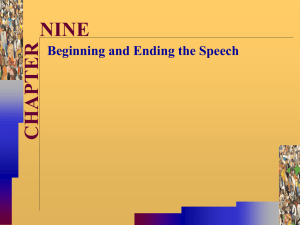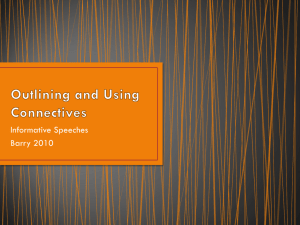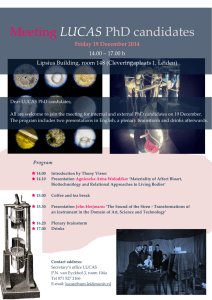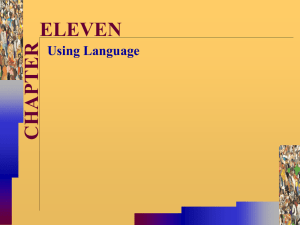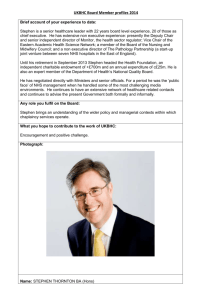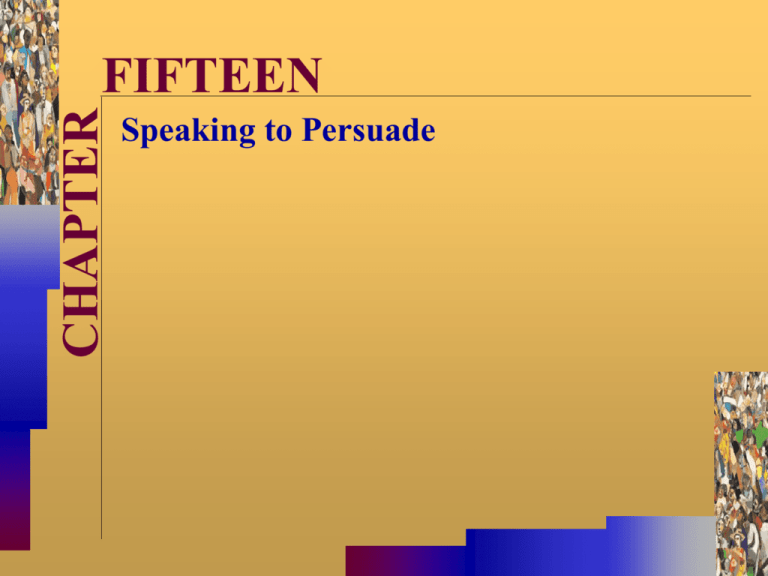
CHAPTER
FIFTEEN
McGraw-Hill
Speaking to Persuade
©Stephen E. Lucas 2001 All rights reserved.
Persuasive Speech
A speech designed to change or reinforce
the audience’s beliefs or actions.
McGraw-Hill
©Stephen E. Lucas 2001 All rights reserved.
Mental Dialogue with the Audience
The mental give-and-take between
speaker and listener during a persuasive
speech.
McGraw-Hill
©Stephen E. Lucas 2001 All rights reserved.
Target Audience
The portion of the whole audience that
the speaker most wants to persuade.
McGraw-Hill
©Stephen E. Lucas 2001 All rights reserved.
Persuasive Speeches
• Speeches on questions of fact
• Speeches on questions of value
• Speeches on questions of policy
McGraw-Hill
©Stephen E. Lucas 2001 All rights reserved.
Question of Fact
A question about the truth or falsity of
an assertion.
Question of Value
A question about the worth, rightness,
morality, and so forth of an idea or
action.
Question of Policy
A question about whether a specific
course of action should or should not be
taken.
McGraw-Hill
©Stephen E. Lucas 2001 All rights reserved.
Persuasive Speech on a Question of Fact
Specific Purpose:
To persuade my audience that another
major earthquake will hit California by
the year 2025.
Central Idea:
There are three good reasons to believe
that another major earthquake will hit
California by the year 2025.
Main Points:
I.
II.
III.
McGraw-Hill
California is long overdue for a major
earthquake.
Many geological signs indicate that a
major earthquake may happen soon.
Experts agree that a major earthquake
could hit California any day.
©Stephen E. Lucas 2001 All rights reserved.
Question of Value
A question about the worth, rightness,
morality, and so forth of an idea or
action.
McGraw-Hill
©Stephen E. Lucas 2001 All rights reserved.
Persuasive Speech on a Question of Value
Specific Purpose:
To persuade my audience that capital
punishment is morally and legally
wrong.
Central Idea:
Capital punishment violates both the
Bible and the U.S. Constitution.
Main Points:
I.
II.
McGraw-Hill
Capital punishment violates the biblical
commandment “Thou shalt not kill.”
Capital punishment violates the
constitutional ban on “cruel and unusual
punishment.”
©Stephen E. Lucas 2001 All rights reserved.
Question of Policy
A question about whether a specific
course of action should or should not
be taken.
McGraw-Hill
©Stephen E. Lucas 2001 All rights reserved.
Persuasive Speech on a Question of Policy
Specific Purpose:
To persuade my audience that America
should act now to protect the quality of
its drinking water.
Central Idea:
Impure drinking water is a serious
national problem that requires action by
citizens and government alike.
Main Points:
I.
II.
McGraw-Hill
Impure drinking water has become a
serious national problem.
Solving the problem requires action by
citizens and government alike.
©Stephen E. Lucas 2001 All rights reserved.
Types of Speeches on
Questions of Policy
• Speech to gain passive agreement
• Speech to gain immediate action
McGraw-Hill
©Stephen E. Lucas 2001 All rights reserved.
Speeches to Gain Passive Agreement
Convince the audience that a given policy is
desirable without encouraging the audience
to take action in support of the policy.
McGraw-Hill
©Stephen E. Lucas 2001 All rights reserved.
Specific Purposes for Persuasive
Speeches to Gain Passive Agreement
• To persuade my audience that there
should be tougher enforcement of laws to
protect the victims of domestic abuse.
• To persuade my audience that college
scholarship athletes should receive a
$200 monthly stipend for personal
expenses.
McGraw-Hill
©Stephen E. Lucas 2001 All rights reserved.
Speeches to Gain Immediate Action
Convince the audience to take action
in support of a given policy.
McGraw-Hill
©Stephen E. Lucas 2001 All rights reserved.
Specific Purpose Statements for Persuasive
Speeches to Gain Immediate Action
• To persuade my audience to volunteer
as literacy tutors.
• To persuade my audience to vote in the
next presidential election.
McGraw-Hill
©Stephen E. Lucas 2001 All rights reserved.
Analyzing Questions of Policy
Three basic issues
• Need
• Plan
• Practicality
McGraw-Hill
©Stephen E. Lucas 2001 All rights reserved.
Need
Is there a serious problem or need that
requires a change from current policy?
McGraw-Hill
©Stephen E. Lucas 2001 All rights reserved.
Plan
If there is a problem with current policy,
does the speaker have a plan to solve the
problem?
McGraw-Hill
©Stephen E. Lucas 2001 All rights reserved.
Practicality
Will the speaker’s plan solve the problem?
Will it create new and more serious problems?
McGraw-Hill
©Stephen E. Lucas 2001 All rights reserved.
Organizing Speeches on Questions
of Policy
• Problem-solution order
• Problem-cause-solution order
• Comparative advantages order
• Monroe’s Motivated Sequence
McGraw-Hill
©Stephen E. Lucas 2001 All rights reserved.
Problem-Solution Order
Specific Purpose:
I.
II.
McGraw-Hill
To persuade my audience that urgent
action is needed to deal with the
environmental problems created by
disposable batteries.
Disposable batteries have become one of
America’s most serious environmental
dangers.
The problem can be solved by business,
government, and individual action.
©Stephen E. Lucas 2001 All rights reserved.
Problem-Cause-Solution Order
Specific Purpose:
To persuade my audience that colleges
and universities should take stronger
action to control campus crime.
I.
Violent crime on college campuses is a
serious problem.
McGraw-Hill
II.
There are three major causes specific to
college life for the growth of campus
crime.
III.
An effective solution must deal with all
three major causes of the problem.
©Stephen E. Lucas 2001 All rights reserved.
Comparative Advantages Order
I.
Unstaffed scientific missions are far
less costly than staffed space flights.
II. Unstaffed scientific missions provide
many more practical benefits than
staffed space flights.
McGraw-Hill
©Stephen E. Lucas 2001 All rights reserved.
Monroe’s Motivated Sequence
1. Attention:
Gain the attention of the audience.
2. Need:
Make the audience feel a need
for change.
Satisfy the sense of need by
providing a solution to the
problem.
Intensify desire for the solution
by visualizing it’s benefits.
Urge the audience to take
action in support of the solution.
3. Satisfaction:
4. Visualization:
5. Action:
McGraw-Hill
©Stephen E. Lucas 2001 All rights reserved.
Fact, Value, or Policy?
• Using lie detector tests as screening devices for
jobs in private business is a violation of the
employee’s right to privacy.
• The use of lie detector tests for screening
employees in private business should be banned
by law.
McGraw-Hill
©Stephen E. Lucas 2001 All rights reserved.
Fact, Value, or Policy?
• A federal law should be passed requiring
that trunk release systems be standard on
all new cars sold in the United States.
• If trunk release systems were standard
equipment on all cars sold in the United
States, we could save a number of children’s
lives each year.
McGraw-Hill
©Stephen E. Lucas 2001 All rights reserved.
McGraw-Hill
©Stephen E. Lucas 2001 All rights reserved.

